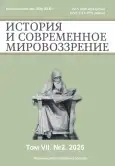Educational System of Ekaterinburg-Sverdlovsk in 1917–1920s: Contradictions of Development
- Autores: Speransky A.V.1
-
Afiliações:
- Institute of History and Archeology of the Ural Branch of the Russian Academy of Sciences
- Edição: Volume 7, Nº 2 (2025)
- Páginas: 72-79
- Seção: SOCIOCULTURAL COMMUNICATIONS IN THE PAST AND PRESENT
- URL: https://journals.eco-vector.com/2658-4654/article/view/688819
- DOI: https://doi.org/10.33693/2658-4654-2025-7-2-72-79
- EDN: https://elibrary.ru/AVDIUQ
- ID: 688819
Citar
Texto integral
Resumo
The article analyzes the process of changes in the Russian educational system that took place during the Russian revolution, Civil war and the beginning of «socialist construction». The author focuses on the contradictions that occurred during attempts to reform the spheres of primary, secondary general and secondary specialized education in Ekaterinburg (since 1924 — Sverdlovsk), which was a large industrial and administrative center of the Urals. The article notes that starting in 1917, until the end of the 1920s, the administrative structures of the city, representing first the Provisional Government, then Bolshevik Dictatorship, White Guard regime, and again the Soviet government, sought to solve the problems of education in accordance with their ideological and political views. As a result, in the context of the social upheavals experienced by the country, the formation of Ekaterinburg-Sverdlovsk educational system took place in an acute political struggle, which included persecution of teachers and students who did not share the position of the established government, and even the use of direct violence against opponents. Ultimately, the article concludes that the Bolsheviks who returned to Ekaterinburg after the expulsion of the White Guards managed, based on the decisions of higher authorities, to organize centralized management of public education, putting it under the control of the Party-Soviet bodies. This made it possible, having overcome the difficulties of the New Economic Policy related to limited funding, to create a fully capable educational system and achieve significant success in the process of eliminating illiteracy.
Texto integral
Sobre autores
Andrey Speransky
Institute of History and Archeology of the Ural Branch of the Russian Academy of Sciences
Autor responsável pela correspondência
Email: avsperansky@mail.ru
Código SPIN: 9138-0510
Dr. Sci. (Hist.), Professor, Honored Worker of Science of the Russian Federation, Head of Center for Political and Socio-Cultural History
Rússia, YekaterinburgBibliografia
- Bakhtina I.L., Popov M.V. Soviet comprehensive schools and teachers in Ekaterinburg during the Civil War (August 1919 — early 1912) // Pedagogical education in Russia. 2017. № 5. Pp. 61–67.
- Igoshev B.M., Popov M.V., Elisafenko M.K., Suvorov M.V. History of the development of pedagogical education in Ekaterinburg (1871–1930). Ekaterinburg: [without a publisher], 2013. 273 p.
- Kal'sina A.A. The position of the People’s Commissariat of Education and the Ministry of Public Education of the government of A.V. Kolchak in the field of school policy during the Civil war // Educational issues. 2009. № 2. Pp. 269–287.
- Klimenko I.M., Popov M.V. Educational schools and teachers of Ekaterinburg during the period of the White Guard governments (July 1918 — June 1919) // Pedagogical education in Russia. 2017. № 3. Pp. 132–139.
- Kudinov E.V. Educational institutions and local governments in the Urals in 1917 — early 1918 // Bulletin of the Surgut State Pedagogical University. 2023. № 1 (82) Pp. 132–137.
- Encyclopedia of Ekaterinburg. Vol. III. Book I. 1917–1941: Center of the Ural Region. Ekaterinburg: LLC «Tourist Information Center of Ekaterinburg», 2019. 184 p.
Arquivos suplementares











